Over the past week, the media paid attention to the referendum in Kazakhstan held to make a decision on building a nuclear power plant in the country. They also reported that Russia has banned grain exports from Kazakhstan, also noting Russia’s plans for the removal of the Taliban from its list of terrorist organizations. Multiple sources picked up on Kyrgyzstan changing its rules on transit payments for European and Chinese goods, hindering efforts to circumvent Western sanctions. Several outlets also reported on Uzbekistan joining the EDB, and Tajikistan acquiring additional funding for the Rogun HPP. Lastly, they also covered Kyrgyzstani President Sadyr Japarov’s visit to Italy.
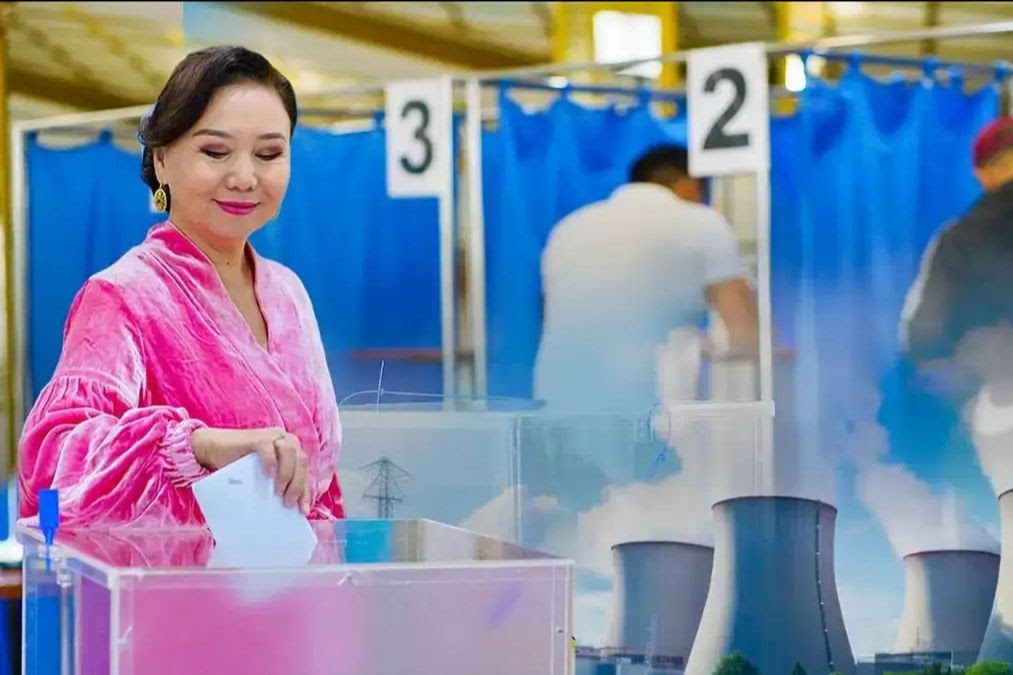
Kazakhstan holds a national referendum on constructing a nuclear power plant. Source: Euro Reporter
NPP Referendum in Kazakhstan
On October 6th, Kazakhstan held a national referendum on constructing a nuclear power plant (The Astana Times). Preliminary results showed that around 70% of voters supported the construction. Observers from the Shanghai Cooperation Organization (SCO) and the Organization of Turkic States (OTS) took part in the process. Sadi Jafarov, head of the OTS observer mission and the organization’s deputy secretary-general, stated “The voting process was professionally managed, and no major irregularities were observed.” However, there have been reports of irregularities with several sources noting attempts by the government to suppress numerous environmental and safety criticisms of the NPP (Vlast). Others have highlighted voting issues throughout the country, with an incident of ballot stuffing recorded in Turkistan (The Times of Central Asia). On October 8, the Central Electoral Commission announced the final results, with 71% supporting the construction of an NPP. Turnout was similarly high at 68.44%, with Kyzylorda region showing the highest participation rate at 82.48%, and Almaty recording one of the lowest with only 25.39% (Kaz Inform). According to the government, constructing the NPP will safeguard Kazakhstan’s energy security and economic prosperity into the future.
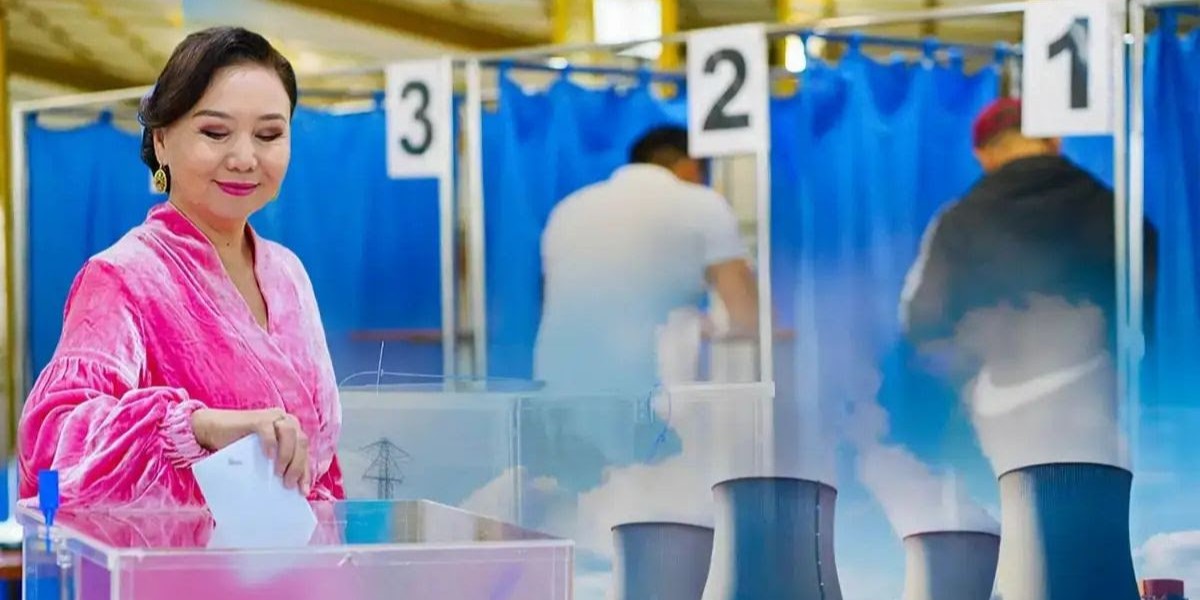
Kazakhstan holds a national referendum on constructing a nuclear power plant. Source: Euro Reporter
Diplomatic Events
Zamir Kabulov, Russian President Vladimir Putin’s special representative to Afghanistan, confirmed that Russia plans to remove the Taliban from its list of terrorist organizations (24.kg). However, he acknowledged that several legal procedures must be fulfilled before implementing the decision. This comes following Putin’s remarks in July that the Taliban was a crucial ally in the fight against terrorism. The Russian Foreign Minister, Sergei Lavrov, has also emphasized the necessity of maintaining “pragmatic dialogue” with Kabul (Daryo). He also noted the Taliban’s success in combatting the narcotics trade and ISIS without naming them directly. While several countries, including the UAE, Uzbekistan, and China, have accepted Taliban ambassadors, no country has recognized the Taliban as Afghanistan’s legitimate government.
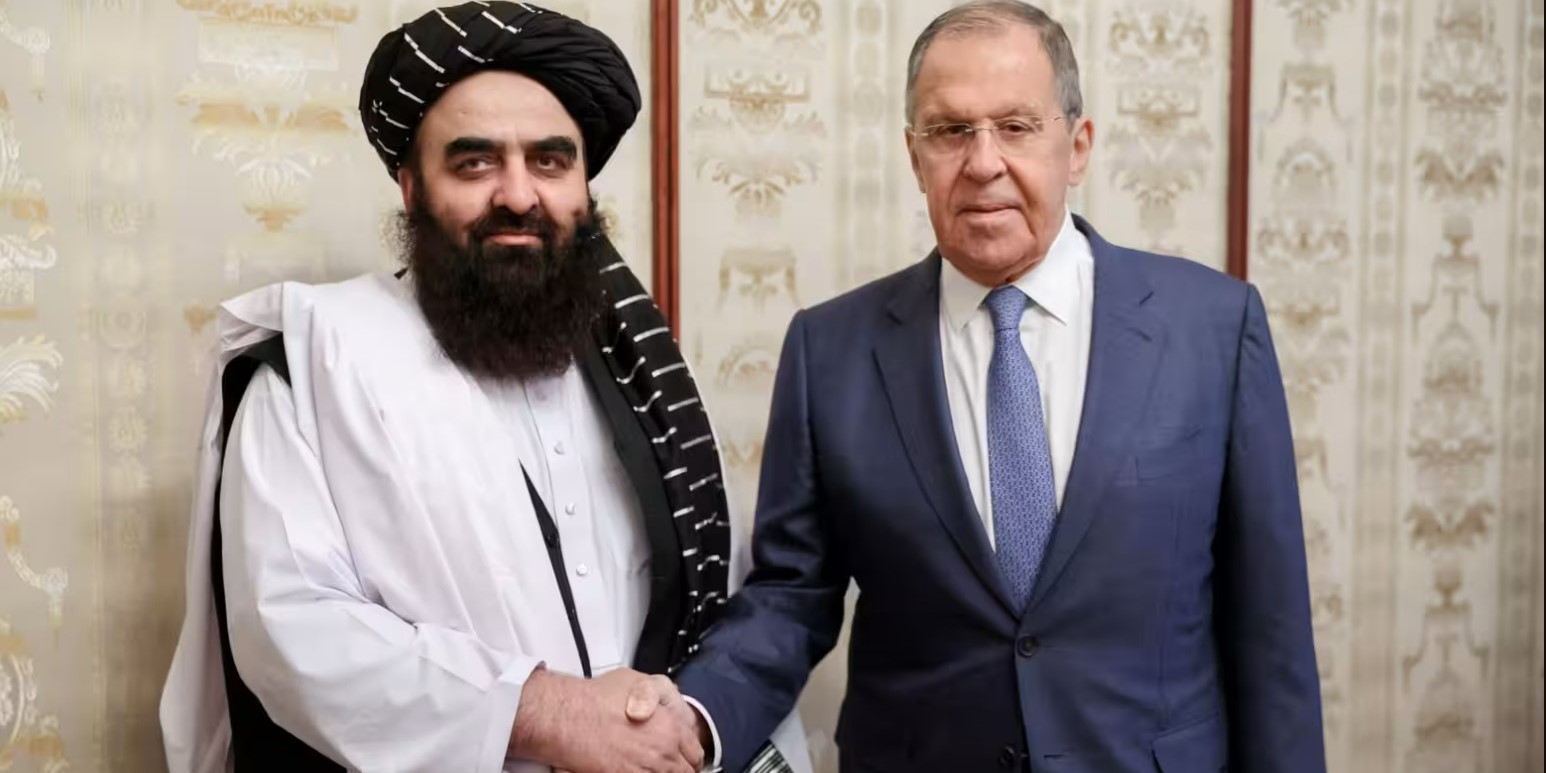
Amir Khan Muttaqi, left, Afghanistan's acting Foreign Minister, shakes hands with his Russian counterpart, Sergei Lavrov, in Moscow on Oct. 4. Source: Russian Foreign Ministry, via Reuters.
From October 2-4, Kyrgyzstani President Sadyr Japarov paid an official visit to Italy. He met with Italian President Sergio Mattarella and discussed developments in bilateral relations between the two countries (24.kg). He also met with Italian business leaders to deepen economic cooperation and investment between the two countries. Both countries’ ministries of justice signed agreements on the extradition and transfer of criminals. President Japarov also held talks with Pope Francis while in Rome.
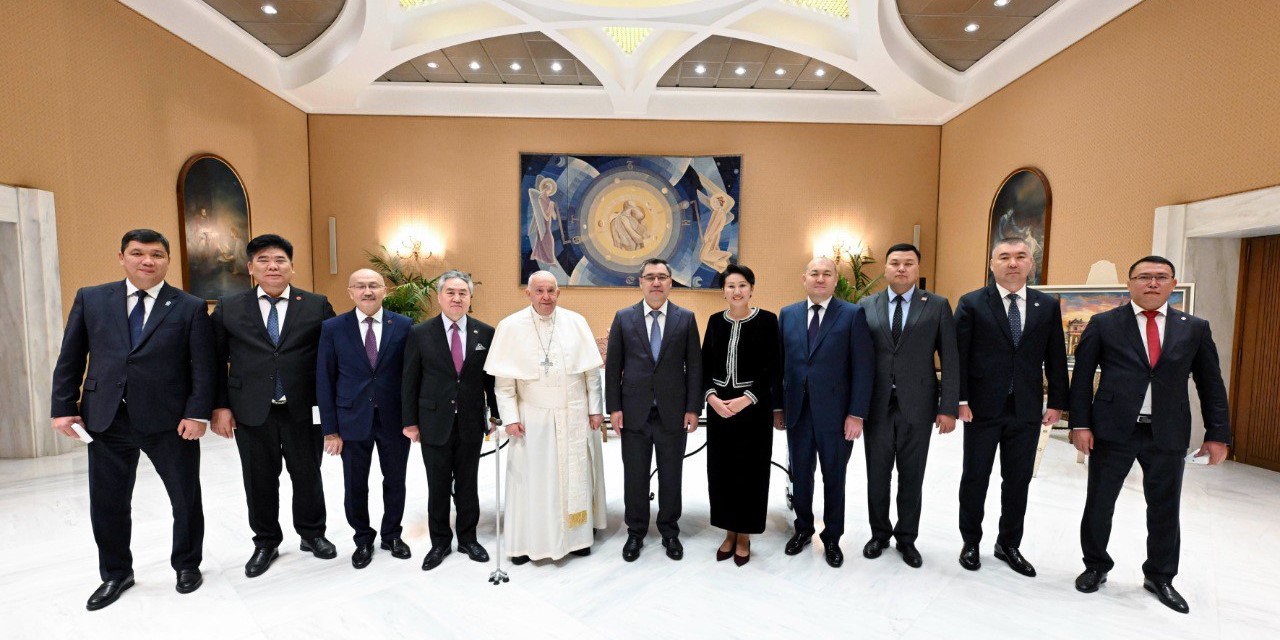
Kyrgyzstani President Sadyr Japarov met Pope Francis in the Vatican. Source: Kabar.kg
Trade
Russia has blocked Kazakhstani grain exports to the country (Fergana). Rossyelkhoznadzor, Russia’s Federal Service for Veterinary and Phytosanitary Supervision, requested that Kazakhstan cease issuing phytosanitary certificates for grain and other processed agricultural products. Reportedly, the Russian side sent the request because of “quarantine objects identified” in grain supplies, with the Kazakhstani side asking for proof of such violations. APK Novosti reported that this is likely a retaliatory measure for Kazakhstan’s ban on Russian grain exports issued on August 1, which was introduced to prevent cheap Russian grain from flooding the market amidst a bumper harvest in Kazakhstan (APK Novosti). Meanwhile, a representative of Kazakhstan’s Grain Union noted that producers were facing difficulties transporting grain through Russia and that the situation could escalate into a full-scale trade war.
Energy
Bloomberg has reported that Kazakhstan is negotiating an increase in gas exports and possibly constructing of a new pipeline with China (BNNBloomberg). Sanzhar Zharkeshov, chief executive officer at QazaqGaz, informed Bloomberg: “We hope to reach a consensus on increasing our export volumes to China and possibly other countries like Uzbekistan.” Kazakhstan already exports around 4 billion cubic meters of natural gas to China annually, with the two countries renewing a three-year export contract in 2023. Qazaq Gaz aims to boost exports to cover unprofitable sales on the domestic market. It is also working with Qatari investors on projects to produce and an additional 3.5 billion cubic meters by 2029. They will construct a second line of the Beineu-Bozoi-Shymkent gas pipeline, three new gas processing plants at the Kashagan field, and a new pipeline from Kostanay to Aktobe (The Astana Times). The current Beineu-Bozoi-Shymkent gas pipeline feeds into a larger pipeline that only operates at around 70% capacity, leaving room for further exports. Qazaq Gaz also plans to issue a Eurobond worth up to $1 billion next year to finance these projects. The CEO also noted that the company remains on track for an initial public offering either in London, New York, or Kazakhstan.
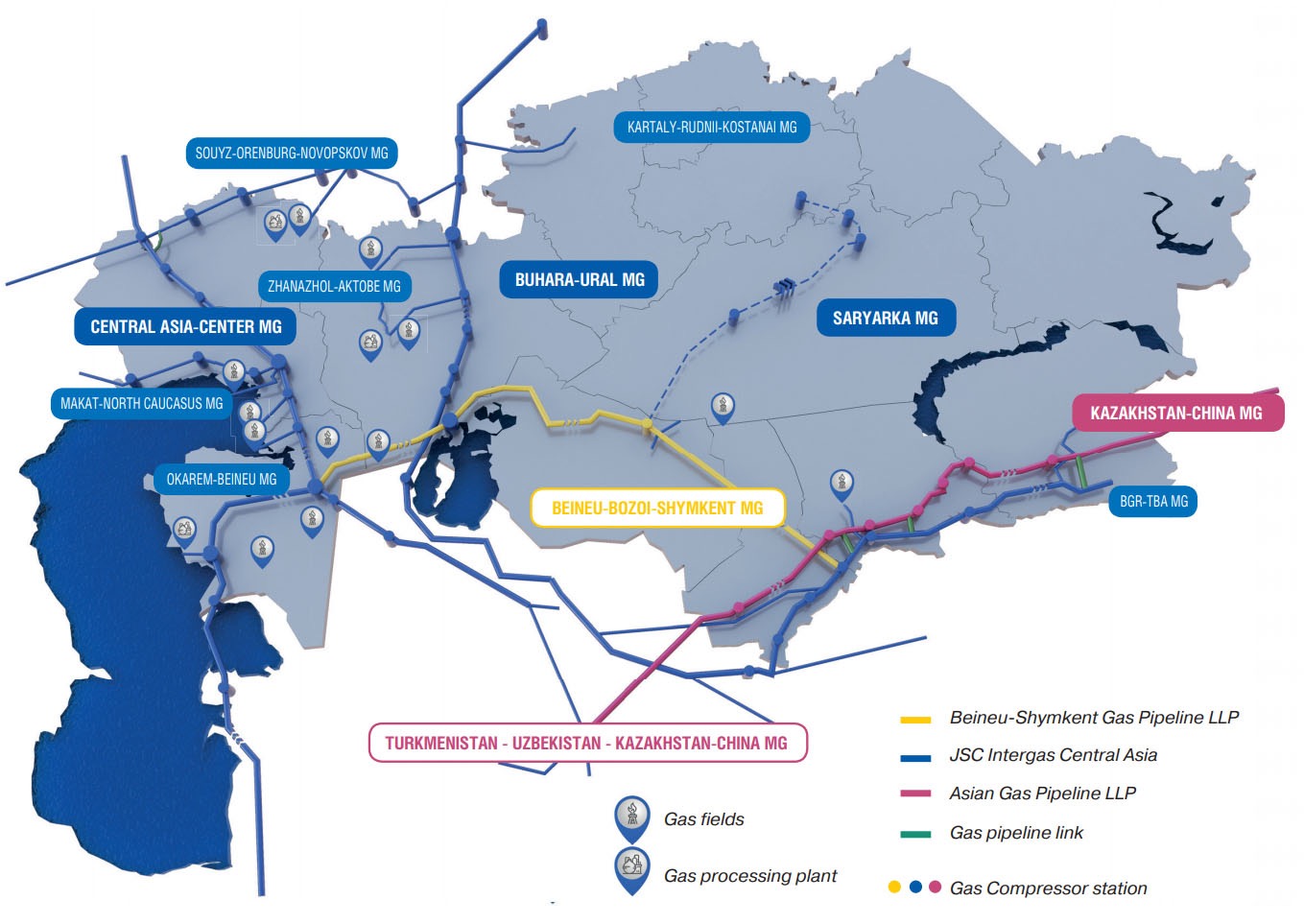
Beineu-Bozoi-Shymkent gas pipeline. Source: CCASC
Russian oil shipments to Uzbekistan via Kazakhstan have increased by 30% from January to August 2024 compared to the same period last year (Kun). Pavel Sorokin, the First Deputy Minister of Energy of Russia, announced the volume increase during a meeting of the cooperation commission between the Federation Council of Russia and the Senate of Kazakhstan. He also noted that the volume of oil supplied to China via Kazakhstan reached 10 million tons. Uzbekistan has increased its petroleum exports by 2.3 times to $409 million in the first eight months of the year, while oil imports surged by 29.5%. The aim is to export increasing amounts of oil and gas while relying on cheaper Russian imports at home.
Logistics
Kyrgyzstan has established new rules for transit payments on goods imported from China and Europe. From September 30, Kyrgyzstani banks will require payers to sign a document guaranteeing the goods will be delivered to the country within 60 days (MSN). In summary, the decree prohibits companies from paying foreign entities for goods without them being delivered to the country (Daryo). It aims to prevent schemes where goods are purchased by shell companies in Kyrgyzstan before being delivered to Russia. This comes after a U.S. Treasury delegation visited the country in August and urged Kyrgyzstani banks to stop aiding Russian companies evading sanctions. The delegation noted that failing to do so could cause them to be cut off from the SWIFT system and face restrictions on dollar transactions.
Investment
At a meeting of the Eurasian Intergovernmental Council in Yerevan, Prime Minister Abdulla Aripov announced that Uzbekistan will join the Eurasian Development Bank (EDB) (Russiaspivottoasia.com). Uzbekistan will acquire 10% of the bank’s equity in the process. The EDB has a charter capital of $7 billion, and Russia, Armenia, Belarus, Kazakhstan, Kyrgyzstan, and Tajikistan are its current shareholders. The EDB aims to invest in infrastructure projects that boost trade and connectivity within and between member states. Joining the EDB is another key step in Uzbekistan acceding to the Eurasian Economic Union in the near future. Uzbekistan is presently an observer state but has discussed joining.
Tajikistani President Emomali Rahmon, at a meeting with the constructors of the Rogun HPP, stated that his government was close to finalizing a $650 million grant from the World Bank and a $500 million loan from the Asian Infrastructure Investment Bank (AIIB) to finish constructing the facility (The Times of Central Asia). Earlier reporting highlighted how loans worth $150 million and $100 million had been secured from the Islamic Development Fund and the Saudi Development Fund (Asia Plus). Negotiations are also ongoing to secure additional funding from the Asian Development Bank, the European Investment Bank, and the Qatar Fund. President Rahmon also noted that since 2008, 42.8 billion Somonis had been allocated to the project from the state budget. The Rogun HPP is one of Central Asia’s most significant hydroelectric projects. Currently, two of the planned six turbines are functional and have produced 7.5 billion kilowatt-hours of electricity since they were installed in 2018.
DABS, Afghanistan’s electricity company, signed three agreements to produce 240 MW of electricity. Two agreements concern the production of 200 MW from solar energy; and the other outlines the production of 40 MW from coal (Tolo News). Mawlawi Abdul Kabir, the Political Deputy of the Prime Minister, and several officials from the Islamic Emirate attended the ceremony. Nooruddin Azizi, the acting Minister of Industry and Commerce, noted land had been allocated for 52 industrial parks and that additional electricity was needed to encourage the growth of these facilities. During the ceremony, Afghanistani and UN officials highlighted the many opportunities for foreign investment in Afghanistan’s energy infrastructure.
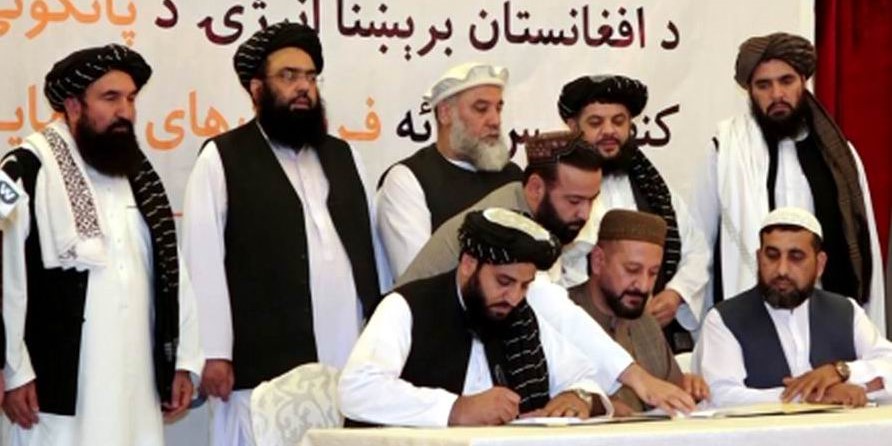
DABS (Afghanistan’s electricity company) signs three agreements to produce 240 MW of electricity. Source: Tolo News
The World Bank will provide Uzbekistan with a $800 million concessional loan to aid its economic reform efforts (Kun). Uzbekistan’s structural reform program aims to enhance the country’s business environment, improve energy, agriculture, and railways efficiency, strengthen the country’s public finances, and prepare the country for future climate challenges, such as water resource management. The loan contains low-cost repayment options and is significantly more competitive than other options on the international market.
Infrastructure
Kazakhstan is set to begin construction of three new regional airports as part of its tourism development program (Kabar). The new airports will be built in key resort areas, such as Katon-Karagai and Zaisan, with construction beginning in 2025. Initially, the airports will feature 2200m runways that will enable the operation of regional aircraft, such as De Havilland Dash 8-400, ATR 42/72, and Bombardier CRJ200. However, the Kazakhstani Transport Minister, Marat Karabayev, acknowledged the possibility of extending the runways to allow for larger aircraft. Overall, the Kazakhstani government aims to open up the country’s eastern regions to tourism through multiple projects, including these planned developments.

